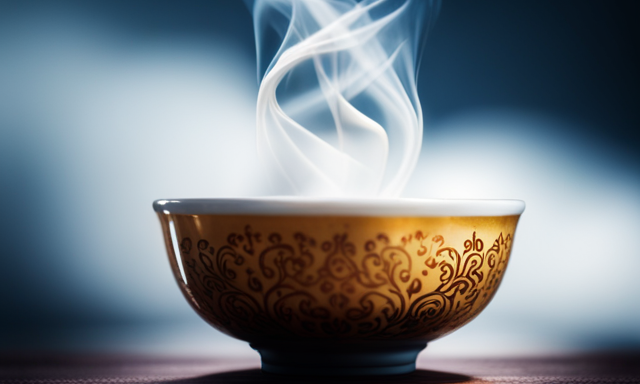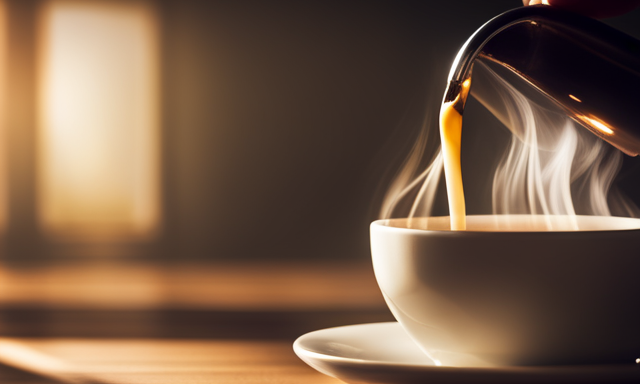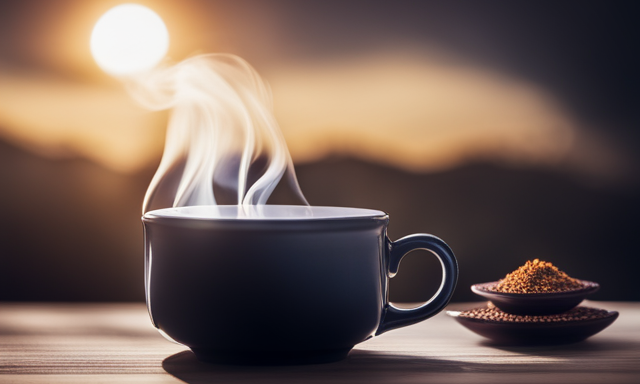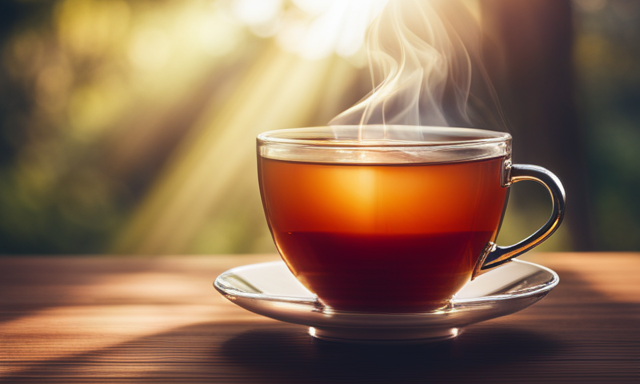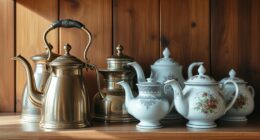I have always enjoyed drinking tea, and recently, I have come to appreciate the amazing variety of oolong tea. It is not only a tasty drink but also offers a wide range of health benefits. However, I have started to question the ideal number of cups of oolong tea I should consume daily in order to fully reap those benefits.
After some research, I’ve got the answers for you. In this article, we’ll delve into the benefits of oolong tea, the different varieties available, and the recommended daily intake. We’ll also discuss any potential side effects and how to brew and enjoy this delightful tea. Whether you’re trying to improve your health or simply enjoy a soothing cup of tea, understanding how much oolong tea to drink each day is key.
So, let’s dive in and uncover the truth behind this tea’s daily dose.
Key Takeaways
- Aim for 2-3 cups of oolong tea per day for best results
- Moderation is important when consuming oolong tea
- Consider individual factors such as age, health conditions, and caffeine sensitivity when determining oolong tea intake
- Consult a healthcare professional for personalized recommendations on oolong tea consumption
Benefits of Oolong Tea
You’ll be delighted to know that oolong tea has a plethora of benefits waiting for you to sip on!
Oolong tea has been found to aid in weight loss by increasing metabolism and fat oxidation. It contains polyphenols that help activate enzymes responsible for breaking down triglycerides.
Additionally, oolong tea promotes skin health due to its high antioxidant content. These antioxidants help protect the skin from damage caused by free radicals, reducing the signs of aging and promoting a healthy complexion.
So, how many cups of oolong tea should you drink to enjoy these benefits? It’s generally recommended to consume 2-3 cups per day.
Now that you understand the benefits, let’s delve into understanding oolong tea varieties.
Understanding Oolong Tea Varieties
Explore the delightful world of various oolong tea flavors, and discover which one suits your taste buds the best! Here are four popular oolong tea varieties to try:
-
Tie Guan Yin: Known for its floral aroma and smooth, mellow taste, this oolong tea is lightly oxidized and has a refreshing character.
-
Da Hong Pao: With a rich, roasted flavor and a hint of mineral notes, this heavily oxidized oolong tea is perfect for those who prefer a stronger taste.
-
Oriental Beauty: Also known as Bai Hao Oolong, this tea has a sweet honey-like taste and a fruity aroma. It is made from leaves that have been bitten by small insects, which contributes to its unique flavor profile.
-
Milk Oolong: This oolong tea is named for its creamy and milky taste. It undergoes a special processing method that gives it its distinct flavor.
Understanding the variety of oolong tea flavors and the different processing methods used can help you choose the perfect cup to enjoy.
Now, let’s delve into the recommended daily intake of oolong tea.
Recommended Daily Intake of Oolong Tea
Delve into the world of oolong tea flavors by discovering the recommended daily enjoyment of this delightful beverage. Oolong tea is not only a refreshing and flavorful drink, but it also offers numerous health benefits.
The recommended daily intake of oolong tea varies depending on individual factors such as age, weight, and overall health. However, as a general guideline, it’s suggested to consume 2-3 cups of oolong tea per day to reap its benefits. Oolong tea contains polyphenols, antioxidants, and other compounds that can boost metabolism, aid in weight management, improve heart health, and promote digestion.
It’s important to note that moderation is key, as excessive consumption of oolong tea may lead to caffeine-related side effects.
Transitioning into the next section, let’s now explore the potential side effects of oolong tea.
Potential Side Effects of Oolong Tea
Be cautious of the possible downsides of indulging in oolong tea, as it can lead to caffeine-related issues if consumed excessively. While oolong tea offers many health benefits, it’s important to be aware of its potential side effects and health risks. Here are some things to keep in mind:
-
Dehydration: Oolong tea is a diuretic, meaning it can increase urine production and potentially lead to dehydration if not consumed in moderation. Remember to drink plenty of water alongside your oolong tea to stay hydrated.
-
Sleep disruption: Oolong tea contains caffeine, which can interfere with sleep if consumed too close to bedtime. To avoid this, it’s recommended to limit your consumption of oolong tea in the evening.
It’s important to strike a balance and listen to your body’s needs. Now, let’s move on to the next section about brewing and enjoying oolong tea.
Brewing and Enjoying Oolong Tea
Let’s dive into the art of brewing and savoring the delightful flavors of oolong tea. Brewing techniques play a crucial role in bringing out the best taste and aroma of this unique tea.
To begin, use freshly boiled water and steep the leaves for about 3-5 minutes, adjusting the time according to your desired strength. The water temperature and steeping time can vary depending on the type and grade of oolong tea you have.
Experiment with different brewing methods like gongfu or western style to discover your preferred flavor profile. Oolong tea offers a wide range of flavors, from floral and fruity to toasty and nutty. Each cup is a delightful adventure for your taste buds.
Now, let’s explore how to incorporate oolong tea into your daily routine seamlessly.
Incorporating Oolong Tea into Your Daily Routine
Start your day off with a soothing cup of oolong tea, allowing the rich flavors to transport you to a tranquil oasis of relaxation. Oolong tea is not only a delicious beverage, but it also offers numerous health benefits. For those looking to shed a few pounds, oolong tea can aid in weight loss. The polyphenols in oolong tea have been shown to increase metabolism and fat oxidation, helping you burn more calories throughout the day. Additionally, oolong tea can serve as a morning pick-me-up, providing a gentle boost of energy without the jitters that come with coffee. To help you visualize the benefits of oolong tea, take a look at this table:
| Benefit | Description |
|---|---|
| Weight Loss | Oolong tea can boost metabolism and aid in fat oxidation. |
| Morning Pick-Me-Up | Oolong tea provides a gentle energy boost without the jitters. |
| Antioxidant Properties | Oolong tea is rich in antioxidants, protecting the body from free radicals. |
| Heart Health | Oolong tea can help lower blood pressure and reduce the risk of heart disease. |
| Mental Clarity and Focus | Oolong tea can improve cognitive function and enhance concentration. |
Incorporating oolong tea into your daily routine is a simple and effective way to reap these benefits. As we move on to the next section about pairing oolong tea with food, you’ll discover even more ways to enjoy this versatile beverage.
Pairing Oolong Tea with Food
Enhance your dining experience by discovering the perfect food pairings that complement the unique flavors of oolong tea. Oolong tea has a distinctive taste that can be enhanced when paired with certain foods.
When it comes to food pairings, oolong tea goes well with a variety of dishes. For a light and refreshing option, try pairing oolong tea with seafood like grilled fish or shrimp. The delicate flavors of the tea can also be complemented by mild cheeses, such as goat cheese or brie.
If you prefer something more hearty, oolong tea pairs nicely with roasted chicken or pork. Additionally, you can incorporate oolong tea into your cooking by using it as a marinade for meats or adding it to sauces and dressings.
By experimenting with different food pairings and cooking with oolong tea, you can create a unique and flavorful dining experience.
Transitioning into the subsequent section about oolong tea and your health goals, you can also enjoy the benefits of oolong tea while exploring new culinary possibilities.
Oolong Tea and Your Health Goals
Achieving your health goals can be supported by incorporating oolong tea into your daily routine. Oolong tea has been known to aid in weight loss by boosting metabolism and increasing fat oxidation. Studies have shown that drinking oolong tea regularly can help to reduce body weight and body fat.
Additionally, oolong tea contains antioxidants that can improve skin health by reducing inflammation and protecting against UV damage. These antioxidants can also help to promote a more youthful appearance and prevent the formation of wrinkles.
So, if your health goals include weight loss or improving your skin health, adding a few cups of oolong tea to your daily routine can be beneficial.
In the next section, we will explore some common myths and facts about oolong tea.
Oolong Tea Myths and Facts
To truly understand the benefits of oolong tea, let’s debunk some common myths and uncover the fascinating facts surrounding this ancient beverage.
-
Oolong tea health benefits: Contrary to the myth that oolong tea is just a tasty drink with no real health benefits, studies have shown that it can actually improve heart health, boost metabolism, and strengthen the immune system.
-
Oolong tea and weight loss: Many people believe that oolong tea is a magical weight loss cure, but the truth is that it can support weight loss efforts by increasing metabolism and reducing cravings. However, it’s important to note that oolong tea alone won’t lead to significant weight loss without a balanced diet and regular exercise.
-
Practical tips: To reap the benefits of oolong tea, aim to drink 2-3 cups per day. Start your day with a cup in the morning, have one after lunch, and enjoy another in the afternoon for an energy boost.
In conclusion, oolong tea offers numerous health benefits and can be a helpful addition to a balanced lifestyle.
Conclusion and Final Thoughts
In conclusion, incorporating oolong tea into your daily routine can provide you with a flavorful way to support your overall health and well-being, backed by scientific research that shows its positive effects on heart health, metabolism, and immunity. Did you know that oolong tea has been consumed for centuries and is enjoyed by millions of people worldwide?
When it comes to oolong tea consumption, it’s important to remember the significance of moderation. While oolong tea offers numerous benefits, it’s essential to consider individual factors for optimal tea intake. Factors such as age, health conditions, and caffeine sensitivity may influence the amount of oolong tea that’s suitable for you.
To determine the ideal amount, it’s best to consult with a healthcare professional who can take into account your specific circumstances. They can provide personalized recommendations and ensure that you’re incorporating oolong tea into your daily routine in a safe and beneficial manner.
So go ahead and enjoy a cup or two of oolong tea each day, keeping moderation and your individual needs in mind.
Frequently Asked Questions
Can oolong tea help with weight loss?
Yes, oolong tea can help with weight loss. It has been shown to increase metabolism and promote fat burning. Incorporating oolong tea into your daily routine may be beneficial for weight management.
Can oolong tea be consumed during pregnancy?
During pregnancy, it is advisable to avoid oolong tea due to potential risks. Studies have shown that consuming high amounts of oolong tea during pregnancy can increase the risk of miscarriage and preterm birth.
Does oolong tea contain caffeine?
Oolong tea contains caffeine, which can provide a natural energy boost and enhance mental alertness. However, the amount of caffeine can vary depending on the brewing method. It’s important to moderate your intake based on personal sensitivity to caffeine.
Can oolong tea improve digestion?
Oolong tea can improve gut health and reduce bloating. It contains compounds that promote digestion and help regulate bowel movements. Incorporating oolong tea into your daily routine can be beneficial for digestive health.
Is oolong tea safe for people with heart conditions?
Oolong tea is generally safe for people with heart conditions, but it may interact with heart medications. It’s important to consult with your doctor to ensure it won’t interfere with your specific medication.
Conclusion
In conclusion, it’s recommended to drink 2-3 cups of oolong tea per day to maximize its health benefits. One interesting statistic to consider is that a study conducted on oolong tea drinkers found that those who consumed 2 cups of oolong tea per day had a 50% lower risk of developing heart disease compared to non-tea drinkers. So, incorporating oolong tea into your daily routine can be a practical and evidence-based way to support your health goals.
Remember to brew and enjoy oolong tea properly for the best results.


